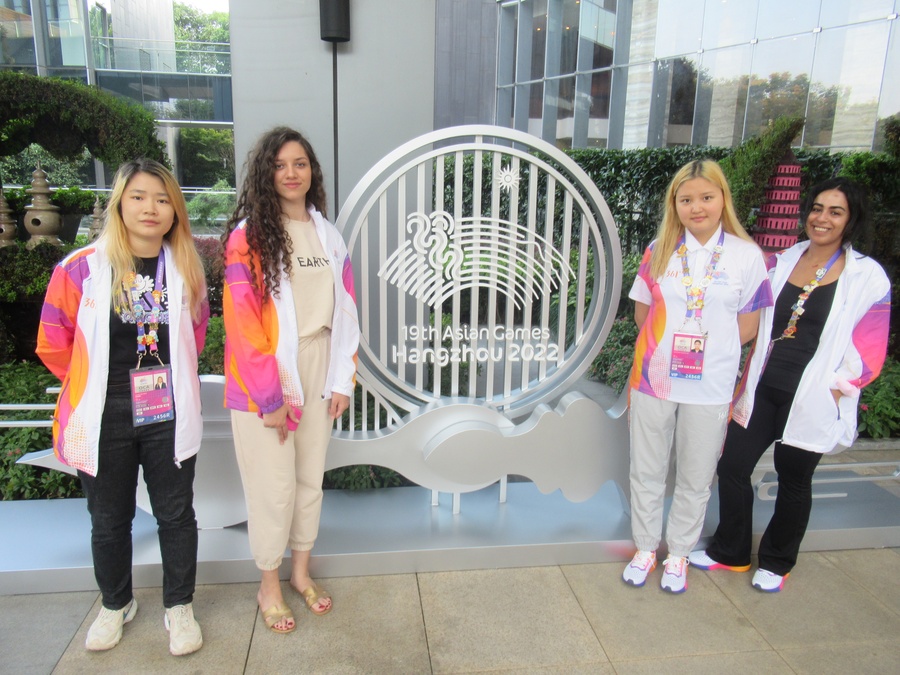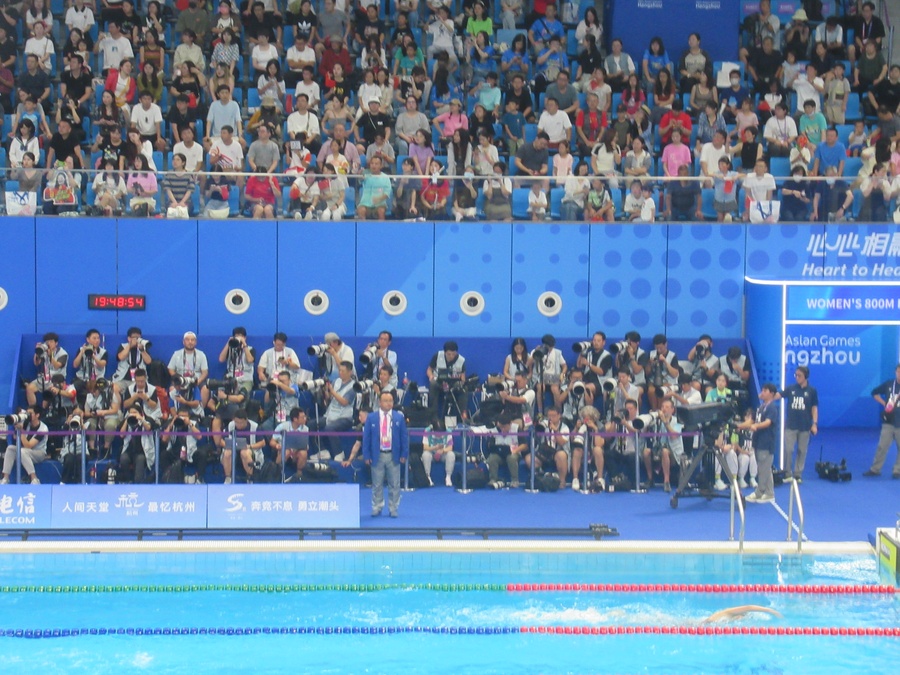By Enkhsaran Baasandorj (OCA Young Reporter from Mongolia)
Hangzhou, China, October 2, 2023: Being selected as a Young Reporter of Mongolia by the OCA was an honor. As a winner, I received a prize to participate in the 19th Asian Games held in Hangzhou. I am delighted that the OCA covered and managed every step of my journey from Paris, where I am studying, to Hangzhou.
Upon arrival, it was very helpful for me to be picked up from Shanghai airport and to arrive in Hangzhou without any trouble. I spent six days with the Young Reporter team, and having a diverse group of young reporters from Kuwait, Palestine, Hong Kong and Tajikistan, while I represented Mongolia, was a unique experience.
I learned many things throughout my journey, as I had never been a reporter at such a significant international sports event before.
If I were to mention a few things about Hangzhou 2022, the first thing that comes to mind is how grand and well-organized it was. Given that people came from 45 Asian countries and regions, the event was incredibly diverse. There were separate villages for athletes, technical staff and media personnel, and numerous competition venues across the city, with a large number of participants.
What left a strong impression on me was the stringent security measures at every entry point leading to a Hangzhou 2022-related area. They meticulously checked everything, from cars to bags, every time you wanted to enter a venue or village. These high standards of security were upheld thanks to the well-trained volunteers. Volunteers were not limited to event areas; many were working in various capacities in Hangzhou, making it easier for our team as they guided us to different venues.
The overall management of Hangzhou 2022, considering the participation of 45 Asian National Olympic Committees competing in 40 sports and 61 disciplines across 54 competition venues, was highly impressive. The technology and communication systems were well-designed and helpful.
I hope everyone at Hangzhou 2022 enjoyed their meals because the right food is essential for the well-being of human beings, especially for athletes at such an important time of their lives. Due to the diversity in agriculture, nature and culture, each country had its own cuisine. Even though Mongolia and China are neighbors, our cuisines are completely different. I loved the variety of cuisines available in the village and the hotel.
From the moment I arrived, our team attended the morning swimming heats, providing me with valuable experience. I had the opportunity to interview Mongolian female swimmers after their heats in the mixed zone. While I had seen mixed zones on TV or in videos, experiencing it in real life was very interesting. I observed some reporters sitting with their laptops on the ground in front of the TV screens when there were no athletes around. However, when athletes arrived, especially if they were famous, reporters would rush to secure interviews. I realized that I needed to be well-prepared to compete in this dynamic environment.
Since Mongolian swimmers were not well-known internationally, I had the chance to interview them in my native language. I interviewed four athletes, asking questions to each team member. However, I learned that it was more effective to direct questions to the team leader, as it reduced the chances of confusion or overlapping answers, especially since three team members were participating in their first international games.
In the evening, the Olympic Council of Asia celebrated "One Asia" at the InterContinental Hotel in Hangzhou. Among the various scenes, the cultural performances from several countries, featuring singing and traditional musical elements, stood out as the best.
The next day, I witnessed the sport of wushu for the first time. It combined martial arts elements, dance movements, and traditional Chinese music, requiring a high degree of flexibility to entertain. It was a very different type of sport compared to what I was used to seeing. I also attended a winners' press conference and wrote news about the medalists. Most questions from reporters were focused on the gold medalists, and it was common for Chinese reporters to inquire about Chinese athletes in their native language. Thanks to translators and recorders, I didn't miss a single word, which highlighted the importance of being well-prepared.
I owe my ability to write news distinct from impression articles to our supervisor, Mr. Jeremy Walker. My day didn't end with wushu; I returned to the swimming venue. It's worth noting that covering swimming competitions from the mixed zone and spectator seats was vastly different. Many reporters faced work pressure and didn't get to enjoy the games. The mixed zone was bustling, and I felt a sense of accomplishment. From the spectator seats, emotions ran high, and the atmosphere was electric. I observed that reporters had dedicated rooms where they could work and watch simultaneously, especially designed for journalists.
The main press center was a significant hub. Journalists, photographers, and Chinese media specialists worked tirelessly across four different halls to cover news and games. In addition to the extensive coverage, we were exposed to innovative technologies. For example, a Chinese bank branch featured a robot capable of communicating in multiple languages and was even learning a third language, Arabic. We also visited an e-sport event, which had a dedicated fan base. It was intriguing to witness its popularity and unique atmosphere. The stadium had its own distinct culture, design, style, and universe.
During my visit to Hangzhou, I had the opportunity to meet the Mongolian administration and media teams in the athlete village. They welcomed me and showed me how the athletes were faring. It was also a pleasure to meet the Mongolian media team and gain insight into their work. As I conducted interviews, I learned how to formulate questions and provide answers effectively. When the media team interviewed me, I knew how to provide the responses they needed. I was pleased that I could express myself fully in the video. I also conducted an interview in the athlete village to write an article. I discovered that interviewing athletes during mealtime was not always the best idea, as many of them were either tired and eager to eat or had to quickly consume their meals before heading to the competition venue. Eventually, I found a few athletes who were more relaxed. One of the highlights of my visit was watching Mongolian athletes compete in judo for the bronze medal. Judo is a national favorite sport in Mongolia, and it was a joy to support them from the stadium seats. In the evening, I had the chance to watch table tennis, my favorite sport.
Before my departure, the Young Reporters' team explored Hangzhou for a day. It was delightful to discover that the city had more to offer than just tall glass buildings. We visited West Lake, enjoyed a traditional boat cruise, and explored the old shopping street.
This learning journey was truly unforgettable. With the guidance of our supervisor, Mr. Jeremy Walker, we learned how to write articles about different sports. Together, we explored many new things and gained valuable experiences at every turn. I am grateful for the opportunity to have been part of Hangzhou 2022 and the OCA Youth Reporter program.


